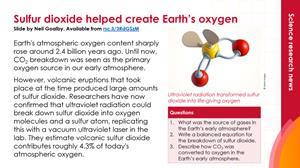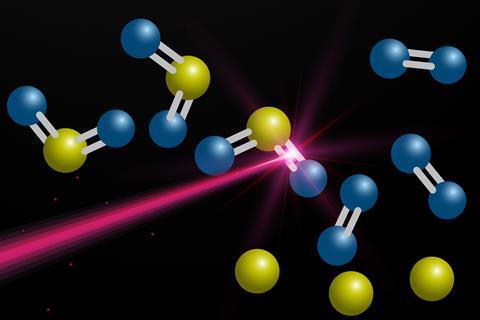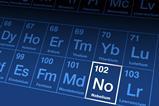Volcanic sulfur dioxide linked to rise in oxygen level in Earth’s early atmosphere
-

Download this
Use this story and the accompanying summary slide to give your 14–16 learners real-world context when studying Earth's atmosphere.
Download the story as MS Word or PDF and the summary slide as MS PowerPoint or PDF.
Around 2.4 billion years ago, Earth experienced a significant surge in atmospheric oxygen levels during the great oxidation event. The cause of this event has long puzzled researchers. The breakdown of carbon dioxide has been cited as a likely contributor. Researchers from China, led by Kaijun Yuan, have made a ground-breaking discovery: a portion of this oxygen likely originated from the breakdown of volcanic sulfur dioxide.

Volcanic eruptions that took place before the great oxidation event, during a period known as the Archean eon, produced large amounts of gaseous sulfur dioxide. While the possibility of this breakdown to produce oxygen has been studied before, its importance in relation to our current atmosphere was unclear. Kaijun Yuan and his team conducted extensive experiments using the intense vacuum ultraviolet free electron laser at the Dalian Coherent Light Source in China. This unique tool was instrumental in helping researchers precisely understand how molecules dissociated.
The scientists’ experiments showed that the dissociation of sulfur dioxide into oxygen and a sulfur atom was possible in the atmospheric conditions of that time. The team estimates that around 4.3% of our current atmospheric oxygen came from volcanic sulfur dioxide.
These findings may also have implications for our understanding of how sulfur dioxide behaves in the atmospheres of other planets and moons in our solar system.
This article is adapted from Kate Tustain’s in Chemistry World.
Nina Notman
References
Y Chang et al, Chem. Sci., 2023, DOI: 10.1039/d3sc03328g
Download this
Summary slide with questions and the article for context when teaching your 14–16 classes on Earth’s atmosphere: rsc.li/44HlsxW
Downloads
EiC summary slide Oxygen from sulfur dioxide
Presentation | PDF, Size 0.18 mbEiC summary slide Oxygen from sulfur dioxide
Presentation | PowerPoint, Size 0.69 mbEiC science research story Oxygen from sulfur dioxide
Handout | PDF, Size 0.16 mbEiC science research story Oxygen from sulfur dioxide
Handout | Word, Size 0.49 mb














No comments yet